- Home
- Beryl Kingston
A Stitch in Time: Sisters facing love loss and triumph in wartime London
A Stitch in Time: Sisters facing love loss and triumph in wartime London Read online
A Stitch in Time
Beryl Kingston
About the Author
Beryl Kingston is the author of 30 novels with over a million copies sold. She has been a writer since she was 7 when she started producing poetry. She was evacuated to Felpham at the start of WWII, igniting an interest in one-time resident poet William Blake which later inspired her novel The Gates of Paradise. She was an English teacher from 1952 until 1985 when she became a full-time writer after her debut novel, Hearts and Farthings, became a bestseller. Kingston continued writing bestsellers for the next 14 years with titles ranging from family sagas to modern stories and historical novels. She currently lives in West Sussex and has three children, five grandchildren, and ten great-grandchild.
Also By Beryl Kingston
Historical Fiction
A Time to Love
London Pride
Hearts and Farthings
Kisses and Ha’pennies
Two Silver Crosses
A Stitch in Time
Avalanche of Daisies
Gates of Paradise
Girl on the Orlop Deck
Off the Rails
Everybody's Somebody
The Easter Empire Trilogy
Tuppenny Times
Fourpenny Flyer
Sixpenny Stalls
Suki
Only Human
Only Young
The Octavia Trilogy
Octavia
Octavia’s War
The Internet Revolutionary
Fiction
War Baby
Maggie’s Boy
Laura’s Way
Gemma’s Journey
Neptune’s Daughter
Francesca and the Mermaid
Non-Fiction
Lifting the Curse
A Family at War
A Stitch in Time
Beryl Kingston
This edition published in 2018 by Agora Books
First published in Great Britain in 1995 by Century as Alive and Kicking
Agora Books is a division of Peters Fraser + Dunlop Ltd
55 New Oxford Street, London WC1A 1BS
Copyright © Beryl Kingston, 1995
All rights reserved
You may not copy, distribute, transmit, reproduce or otherwise make available this publication (or any part of it) in any form, or by any means (including without limitation electronic, digital, optical, mechanical, photocopying, printing, recording or otherwise), without the prior written permission of the publisher. Any person who does any unauthorised act in relation to this publication may be liable to criminal prosecution and civil claims for damages.
To Louise, Steven, Charlotte,
James and Phoebe
who are the apples of my eye
Chapter 1
The war against Germany was barely a month old and all over Great Britain patriotism burned like fever. London was crazed with it.
Newspaper headlines grew taller by the day, bragging of victory at the River Marne; citizens strutted and preened; shop windows erupted into an enthusiasm of ribbons and bunting and brand-new Union Jacks. Some windows sported a picture of King George and Queen Mary, looking severe, and a hand-painted slogan, like ‘Britons Never Shall Be Slaves’, or ‘For King and Country’, or even more passionately ‘God Bless Our Boys!’ Others gave space to the new recruiting posters with their demanding, professional type, ‘Do Your Duty! Enlist Now! Join Today!’ and their huge, noble faces — white whiskers drooping like the bags under their eyes — each one confident in the expectation that the young men of the capital would spring to the defence of their country in her hour of need. It looked and felt like a carnival — and on the third Saturday in September 1914, it sounded like one too.
It was just after five o’clock and the market in Lambeth Walk was at its busiest, the street almost impassable for stalls and shoppers, when there was a sound like a sudden clap of thunder. It was so loud that it made Rose Boniface jump. She’d been picking over the second-hand blouses at Mrs Tuffin’s tot stall, looking for something decent to cut down for her younger sisters to wear to school. She’d already found a blue cotton for Mabel. Now she stopped, one hand on the white lawn of a lady’s blouse that she was considering for Netta and looked up at the sky.
‘What on earth was that?’ she said.
‘Drums, you ask me dear,’ Mrs Tuffin said, her eyes firmly on the merchandise. As befitted a lady of her trade, she was a decidedly blowsy woman with a plump pink face, plump pink arms, fat fingers, a bosom that billowed over the tight leather constriction of her belt, and hips like cushions bulging under her long black skirt. She wore one of her own blouses, a confection in bottle-green taffeta threaded with tartan ribbon and decorated by rows of small jet beads and, squashed on top of her bun of black hair, a large straw hat of indeterminate colour.
Standing before such an abundance of flesh and finery, Rose Boniface looked like a waif. At seventeen, she was no taller than she’d been at fourteen when she took over the care of her brothers and sisters and became the mother of the family — a mere five foot and skinny with it. Her neck was too slender under the soft twist of nut-brown hair pinned at her nape, her hands too small with thin supple fingers, her wrists so fragile you felt you could snap them by looking at them. Yet, despite a childhood marred by too much hard work, too many worries and too little food, there was a gentleness about her face that was quite remarkable. It was already womanly, oval-shaped and set off by a natural fringe of wispy curls. True, her cheeks were too thin, her skin had the town dweller’s unhealthy pallor and there were poverty shadows under her eyes, but her forehead was high and broad, her nose retroussé, chin prettily rounded, mouth a perfect Cupid’s bow and her eyes themselves were widely spaced, dark grey and fringed with thick brown lashes. In short, Rose Boniface had the makings of a beauty.
The sudden thunder-crack had progressed into rhythm. ‘It’s a parade,’ our beauty said, eyes gleaming at the thought.
Mrs Tuffin could see her sale slipping away. ‘Would you like me to put that by for yer?’ she asked, tucking a straying lock of hair under her hat. ‘It’s a good bit a’ cloth. You could come back for it tomorrow.’
Rose pulled her mind back to the business in hand. ‘It’s gone under the arms,’ she said, lifting up the sleeves. ‘It’ll need a lot a’ working over. It ain’t worth thruppence, Mrs Tuffin.’ She wasn’t bargaining — she was too open and honest to do that — she was simply pointing out the flaws in the purchase.
Normally, Mrs Tuffin would have argued until a better price had been agreed but she liked Rose and knew what an effort she made to keep her family well fed and respectable.
‘Tell you what,’ she suggested, picking up another white blouse. ‘I’ll throw this one in an’ all, and you can use it for repairs. It’s in pretty good nick at the back. See?’
‘It’s a bad colour,’ Rose said. ‘I’d rather have that old ecru one, Mrs Tuffin, if it’s all the same to you. The one with the torn sleeves. That ’ud make a nice contrast.’
Mrs Tuffin considered for a second, as the music drew near enough for them to discern a tune. ‘All right,’ she said, making her mind up. ‘As it’s you, Rose, you can have the three for a tanner. I can’t say fairer than that, can I, gel?’
The sixpence was handed over and the blouses bundled into Rose’s clean shopping bag. Now there was no doubt that the rhythmic noise was a band and at the end of the Walk, what’s more. People were heading towards it all along the street, agog for excitement. Rose trotted after them and arrived at the Black Prince Road just in time to see the tail-end passing under the railway bridge. It was a detachment of the Queen’s, marching briskly and preceded by a drum and fife band, drums in pounding unison, pipes squealing like pigs. What a lark!
To her surprise she saw her big brother Bertie standing outside the pub on the other side of the road. She hadn’t expected him home from work so soon, but there he was, tall and dependable and cheerful, nodding his head in time to the music. He looks just like Dad she thought lovingly, taking him in — flat cap, old jacket, muffler flying in the breeze — you can see what a worker he is. Dear Bertie.
‘Whatcher Rose,’ he said, as she crossed the road to join him. ‘What price this for a lark, eh? If we was to run, we could catch up with ’em and see the whole thing from start to finish.’
So, they ran, shopping forgotten, two of a great crowd hurtling off to enjoy the display. And were not disappointed, for seen from the front, the soldiers looked as grand as they sounded, their kit immaculate and their expressions determined. They were led by a resplendent recruiting officer, a sergeant major with a brick-red face and a chest like a pouter pigeon, and by the time they reached Kennington Cross, they had drawn a long, straggling crowd behind and beside them, like a magnet trailing iron filings — factory workers like Bertie, women out shopping like Rose, clerks with self-important expressions, grimy boys in rags, elderly gentlemen stepping out boldly in time to the music, and, down beside the well-polished boots and carefully wound puttees of the contingent, a flea-bitten collection of Kennington mongrels yapping themselves silly with uncontrollable patriotism.
The procession continued into Kennington Road and came to a halt outside the Town Hall where it was greeted by a councillor, sweating under his ceremonial topper. The s
ergeant major took up a stand in the middle of the small green called Kennington Park while his detachment stood in bright ranks on either side of him and drummed for attention. Within two minutes all trade and traffic had come to a standstill as cars and carriages were ordered to stop at once, errand boys forgot their errands, eager faces appeared in every window on all five storeys of the houses round the green and the Saturday shoppers told one another there had never been anything to equal this, never in a hundred years.
The sergeant major surveyed the scene with satisfaction, fondled his moustache and silenced the drummers with a glance.
‘This ’ere band,’ he bellowed at his fascinated audience, ‘will be playin’ for the next two minutes. No more nor less! Two minutes. Then Councillor Thomas has got sommink to say to you, and I got sommink to say to you, and you won’t none of you want ter miss a word of it, believe me. If you got friends what ain’t here, do ’em a favour. Nip orf an’ get ’em. Sharpish! ’Cause I tell you, they’ll kick their selves if they ain’t here to hear this.’ He paused to let his words sink in. ‘Two minutes,’ he warned, and shot another steely glance at his instrumentalists who instantly began to play their tune again, very loudly.
Young men scuttled off in every direction to do his bidding, more faces appeared at the windows, the crowd grew by the second and the band completed its two-minute entertainment with a drum crescendo, white gloves flying like birds. Then the councillor began his speech which was blown into inaudibility by the evening breeze. But because he smiled a great deal and waved his arms about, his audience gave him a happy cheer when he seemed to have finished. Then the sergeant major took over again.
‘Hever since our glorious vic’try at the Battle of the River Marne,’ he bellowed, ‘we got the ’Un on the run. Thirty miles from Paris they was when our lads got stuck into ’em. And what did they do then, lads? I’ll tell you what they done. Beggared off out of it as fast as their little yellow legs ’ud carry ’em. That’s what they done. And for why? I’ll tell you for why. For two reasons. Because your ’Un is a coward. And because the British Hexpeditionary Force is a fine body a’ men, highly trained, perfessional soldiers, British an’ proud of it.’ He paused to give his audience time to cheer, which they did, with fervour. ‘Nah then,’ he continued. ‘I come down here this evening to give you the chance to join our victorious Army. Chance of a lifetime. Come Christmas, the German war machine’ll be finished for good an’ all. We nearly knocked the stuffing out a’ them all-a-ready. So whatcher say boys? All you got to do is take the shillin’. Just think a’ the benefits. Free grub, free uniform, free lodgin’, an’ seven bob a week on top of all that. You’ll have the world at your feet my lads. The world at your feet an’ any girl you want jest for the asking. There ain’t a girl alive what don’t love a soldier.’ Appealing to the women in his audience. ‘Ain’t that right my darlin’s? An’ if you’re a married man, sir — since you’re asking — even better. Wife’s allowance nine bob, wife an’ child fourteen shillings, two an’ a kick for every child on top a’ that. You could live like lords. Like lords me lads. An’ all you’ve got to do is cross the road to the recruiting office over there an’ take the shillin’. What could be simpler?’
What indeed, put like that? The recruiting office at the Town Hall was clearly labelled. The flags were flying. There was even an army sergeant standing by the door ready to welcome them in.
The sergeant major looked at the ranks of ardent young faces turned towards him and his world — at dark cloth caps and work-grimed clothes, at collarless shirts and frayed mufflers, at the trusting innocence of young men lifted by his oratory and, in their unaccustomed stillness, touched with glory by the setting sun.
‘Well?’ he demanded.
‘He’s right,’ Bertie Boniface said to his sister. ‘I ought to do it, our Rose.’
Rose tucked her hand into the crook of his arm and gave it a squeeze. Ever since this war had been declared, she’d known he would volunteer for it sooner or later. She was so proud of him. ‘A’ course,’ she agreed, smiling at him. ‘You go our Bertie.’
A queue was forming outside the recruiting office and young men were running towards it from every side.
‘Three cheers for our brave lads,’ the sergeant major cried. ‘Hip-pip-pip-pip! Hooray!’
Bertie ran at the second cheer.
I shall never forget this moment, Rose thought, watching him as he stood in the line. Our Bertie going for a soldier. And all them young fellers running to take the shilling and defend the country and everything. She was proud of them all. But specially Bertie, dear loving Bertie, who’d fathered the family ever since mum died and worked like a Trojan to look after them all. He’s so good, she thought. Always has been. Wait till we tell them in Ritzy Street. Won’t they be thrilled!
It took a long time to enlist. By the time Bertie came striding out of the recruiting office, it had grown quite dark. The band had long since marched away, the gas lights were being lit and the air was chill and smelt of soot and smoke.
‘Come on,’ he said, taking charge in his usual way. ‘Pie and mash tonight. We’ve got somethink to celebrate.’
So, they stopped off at the Cross for five portions and a large bottle of ginger beer. Then they took the short cut to Ritzy Street through Windmill Row, across the main road to Courtenay Street — where some lovely, new, yellow-brick houses were being built for the Duchy and there were gas lights to mark the way — left by the pub and north for home, Rose trotting to keep up with her brother’s lengthy stride.
Unlike the roads in the Duchy estate, Ritzy Street was short, narrow, and poorly lit. It had once led down to the Thames, to a landing-stage between the Doulton pottery works and the Gunhouse stairs, but now it was cut off from the riverside by the railway embankment and the wide sweep of the London and South Western railway line which filled the area with the chuff and clutter of engines, day and night, and dropped sulphur stains and black smuts on to doorsteps and curtains and any washing the inhabitants were foolhardy enough to hang out. The houses were built in long, soot-blackened terraces and each house contained a basement kitchen and nine living rooms, three on each floor. It wasn’t the most comfortable place in which to live, but it had provided a home for the Bonifaces at a time when they stood in danger of the workhouse, and for that Rose was fond of it and felt at ease and happy there. When they first moved in to Number Twenty-Six, they’d occupied the second-floor back, which was the worst room in the house; now they had graduated to the two front rooms on the first floor and she and Netta and Mabel had a bedroom of their own, divided from Collum and Bertie by a wall instead of a curtain.
Netta was leaning out of their bedroom window with her hands on the sill, watching out for them. The light from the gas lamp outside the front door edged her sharp features with gold and made the long straggle of her hair gleam like dark water as it hung over the sill on either side of her gilded hands. But her voice was far from romantic.
‘Where’ve you been?’ she wanted to know. ‘I been waiting hours. I’m famished!’
‘Set the table,’ Bertie called up to her. ‘We got pie and mash. Where’s the others?’
‘Playing out,’ Netta said in a tone that implied he was foolish even to ask. ‘Where d’you think?’ And she left the window to prepare the table.
Bertie put two fingers in his mouth and gave a long shrill whistle —once, twice, three times. It was his usual signal to call the kids home and sure enough, after a second, there was a scramble at the blocked-off end of the alley and one of Mabel’s boots appeared at the top of the wall followed by a black-stockinged leg and a flash of white pinafore. Then the rest of her body appeared, and she sat on top of the wall, swinging her legs, ready to jump down. She was ten years old, but, because she was simple-minded, she looked younger, short, stout and moon-faced, her clothes patched and grubby and her hair in perpetual tangles. But she was a cheerful creature and full of affection. ‘’Lo, our Bertie,’ she called.

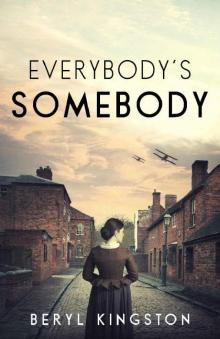 Everybody's Somebody
Everybody's Somebody Sixpenny Stalls
Sixpenny Stalls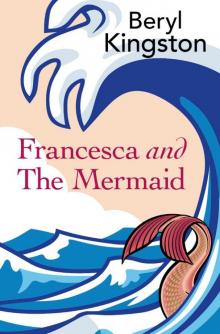 Francesca and the Mermaid
Francesca and the Mermaid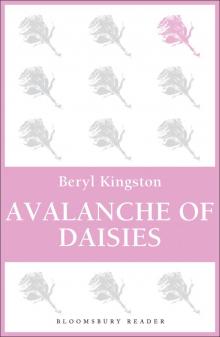 Avalanche of Daisies
Avalanche of Daisies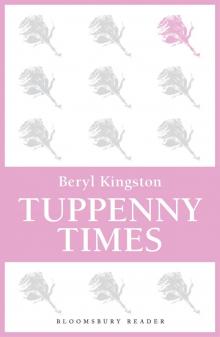 Tuppenny Times
Tuppenny Times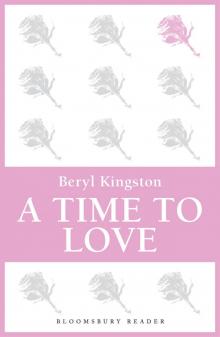 A Time to Love
A Time to Love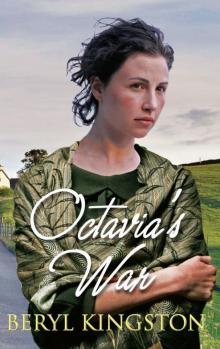 Octavia's War
Octavia's War Gemma's Journey
Gemma's Journey London Pride
London Pride Gates of Paradise
Gates of Paradise Octavia
Octavia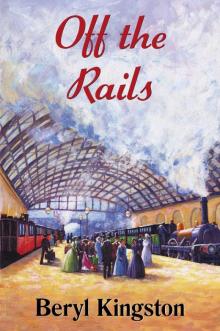 Off the Rails
Off the Rails Maggie's Boy
Maggie's Boy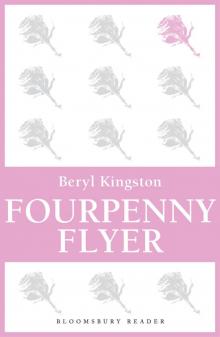 Fourpenny Flyer
Fourpenny Flyer